
 i_need_contribute
i_need_contribute

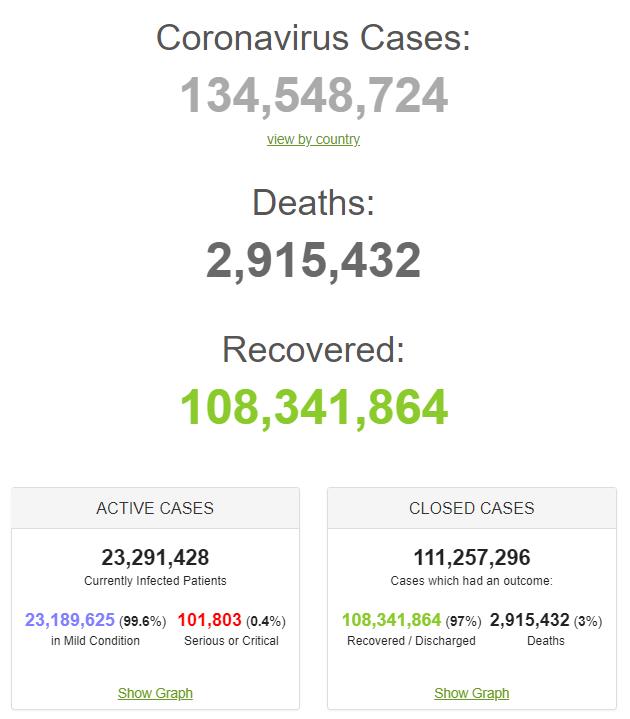
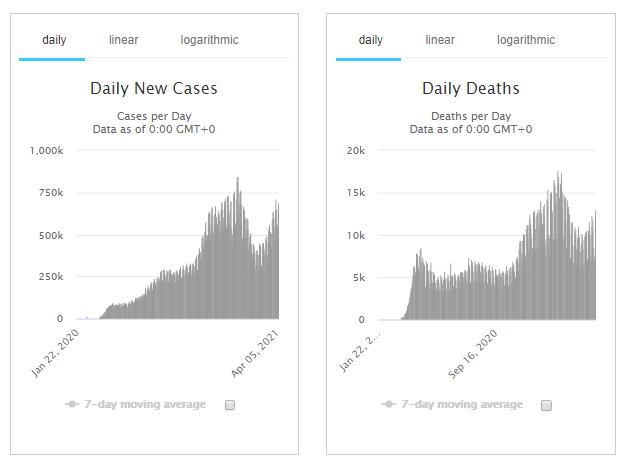
| Country, | Total | New | Total |
| Other | Cases | Cases | Deaths |
| World | 134,504,393 | 739,130 | 2,914,247 |
| USA | 31,717,404 | 80,161 | 573,856 |
| Brazil | 13,286,324 | 89,293 | 345,287 |
| India | 13,057,954 | 131,893 | 167,694 |
| France | 4,939,258 | 15,869 | 98,065 |
| Russia | 4,614,834 | 8,672 | 101,845 |
| UK | 4,370,321 | 3,030 | 126,980 |
| Italy | 3,717,602 | 17,221 | 112,861 |
| Turkey | 3,689,866 | 55,941 | 33,201 |
| Spain | 3,336,637 | 9,901 | 76,179 |
| Germany | 2,951,829 | 24,257 | 78,473 |
| Poland | 2,499,507 | 27,887 | 56,659 |
| Colombia | 2,492,081 | 12,464 | 65,014 |
| Argentina | 2,473,751 | 23,683 | 57,122 |
| Mexico | 2,261,879 | 5,499 | 205,598 |
| Iran | 2,006,934 | 22,586 | 63,884 |
| Ukraine | 1,803,998 | 19,419 | 35,962 |
| Peru | 1,617,864 | 9,966 | 53,978 |
| Czechia | 1,567,848 | 7,015 | 27,466 |
| South Africa | 1,554,975 | 1,366 | 53,173 |
| Indonesia | 1,552,880 | 5,504 | 42,227 |
| Netherlands | 1,327,136 | 7,783 | 16,691 |
| Chile | 1,051,270 | 8,248 | 23,979 |
| Canada | 1,036,023 | 7,982 | 23,211 |
| Romania | 993,613 | 4,989 | 24,733 |
| Belgium | 908,212 | 3,539 | 23,301 |
| Iraq | 903,439 | 7,817 | 14,606 |
| Sweden | 849,629 | 13,595 | |
| Israel | 835,486 | 270 | 6,279 |
| Philippines | 828,366 | 9,216 | 14,119 |
| Portugal | 825,633 | 602 | 16,899 |
| Pakistan | 705,517 | 5,329 | 15,124 |
| Hungary | 698,490 | 4,814 | 22,681 |
| Bangladesh | 666,132 | 6,854 | 9,521 |
| Jordan | 655,456 | 4,775 | 7,565 |
| Serbia | 633,013 | 3,625 | 5,620 |
| Switzerland | 615,024 | 2,449 | 10,445 |
| Austria | 568,914 | 2,906 | 9,586 |
| Morocco | 500,323 | 635 | 8,873 |
| Japan | 492,875 | 3,299 | 9,301 |
| Lebanon | 489,428 | 3,510 | 6,549 |
| UAE | 478,131 | 2,112 | 1,523 |
| Saudi Arabia | 395,854 | 902 | 6,728 |
| Slovakia | 368,470 | 1,576 | 10,322 |
| Bulgaria | 367,376 | 2,957 | 14,170 |
| Panama | 357,704 | 427 | 6,152 |
| Malaysia | 355,753 | 1,285 | 1,308 |
| Ecuador | 341,619 | 2,015 | 17,115 |
| Belarus | 331,808 | 1,272 | 2,324 |
| Greece | 288,230 | 3,215 | 8,680 |
| Georgia | 286,406 | 761 | 3,849 |
| Croatia | 285,765 | 3,217 | 6,185 |
| Azerbaijan | 279,181 | 2,717 | 3,811 |
| Nepal | 279,100 | 332 | 3,038 |
| Bolivia | 277,966 | 1,076 | 12,385 |
| Tunisia | 266,827 | 1,833 | 9,136 |
| Palestine | 262,017 | 2,884 | 2,781 |
| Kazakhstan | 261,503 | 2,586 | 3,171 |
| Dominican Republic | 256,031 | 1,094 | 3,378 |
| Kuwait | 242,848 | 1,379 | 1,383 |
| Ireland | 239,723 | 398 | 4,737 |
| Moldova | 239,146 | 1,428 | 5,307 |
| Denmark | 235,648 | 717 | 2,436 |
| Paraguay | 229,595 | 2,479 | 4,644 |
| Ethiopia | 223,665 | 2,121 | 3,078 |
| Slovenia | 223,416 | 1,527 | 4,097 |
| Lithuania | 223,127 | 1,067 | 3,647 |
| Costa Rica | 219,846 | 3,000 | |
| Egypt | 208,082 | 789 | 12,323 |
| Armenia | 200,129 | 1,231 | 3,675 |
| Guatemala | 199,964 | 1,590 | 6,955 |
| Honduras | 193,029 | 616 | 4,703 |
| Qatar | 187,150 | 949 | 322 |
| Bosnia and Herzegovina | 180,831 | 1,583 | 7,216 |
| Venezuela | 171,373 | 1,184 | 1,720 |
| Oman | 168,005 | 1,320 | 1,747 |
| Libya | 166,156 | 869 | 2,799 |
| Nigeria | 163,581 | 83 | 2,058 |
| Bahrain | 153,074 | 1,143 | 548 |
| Kenya | 143,063 | 1,698 | 2,292 |
| Myanmar | 142,549 | 8 | 3,206 |
| North Macedonia | 138,891 | 1,163 | 4,108 |
| Uruguay | 130,657 | 3,670 | 1,275 |
| Albania | 127,509 | 317 | 2,297 |
| Algeria | 118,116 | 112 | 3,119 |
| Estonia | 112,421 | 757 | 990 |
| S. Korea | 107,598 | 700 | 1,758 |
| Latvia | 105,916 | 740 | 1,963 |
| Norway | 101,960 | 1,286 | 684 |
| Sri Lanka | 94,253 | 343 | 591 |
| Montenegro | 93,566 | 257 | 1,345 |
| Ghana | 91,109 | 100 | 752 |
| China | 90,365 | 24 | 4,636 |
| Kyrgyzstan | 89,660 | 222 | 1,516 |
| Zambia | 89,592 | 206 | 1,225 |
| Uzbekistan | 84,322 | 195 | 634 |
| Cuba | 83,515 | 914 | 443 |
| Finland | 80,842 | 426 | 866 |
| Mozambique | 68,466 | 35 | 788 |
| El Salvador | 65,491 | 2,040 | |
| Luxembourg | 63,180 | 387 | 762 |
Retrieved from: https://www.worldometers.info/coronavirus/
By Julia Hollingsworth and Emiko Jozuka, CNN
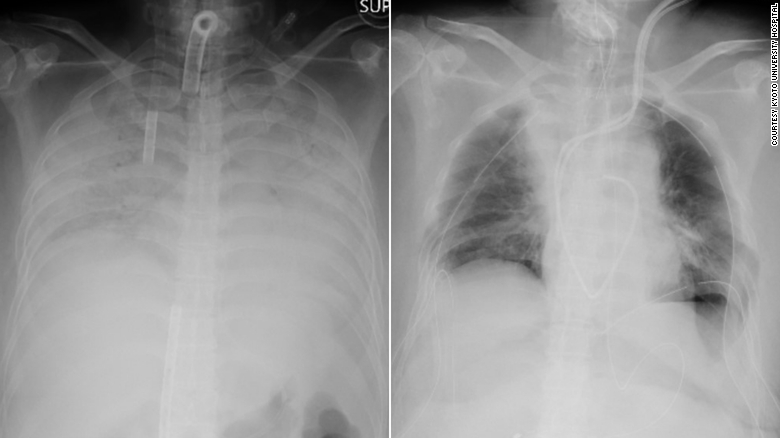
X-ray images show the patient's chest before the transplant operation, left, and after, right. The dark areas indicate where lung tissue has been transplanted.
(CNN)A Japanese woman whose lungs were severely damaged by Covid-19 has received what doctors say is the world's first lung transplant from living donors to a recovered coronavirus patient.
Kyoto University Hospital said the woman underwent an 11-hour operation by a 30-strong medical team on Wednesday to transplant lung tissue from her husband and son.
Covid-19 is known to cause severe lung damage in some patients, and people around the world -- including the United States -- have received lung transplants as part of their recovery from the disease.
But the Kyoto hospital said this case was the first in which lung tissue had been transplanted from living donors to a Covid-19 patient.
Dr. Hiroshi Date, a thoracic surgeon at the hospital who led the operation, said it gave hope to patients suffering from severe lung damage from Covid-19.
"We demonstrated that we now have an option of lung transplants (from living donors)," he said at a Thursday news conference.
The patient, identified only as a woman from Japan's western region of Kansai, contracted Covid-19 late last year, and spent months on a life support machine that worked as an artificial lung, according to Kyoto University Hospital.
Covid-19 caused so much damage to her lungs they were no longer functional, and she required a lung transplant to live.
The woman's husband and son offered to donate parts of their lungs. Transplants from brain-dead donors are still rare in Japan, and live donors are considered a better option, according to the hospital's statement.
The husband and son are in a stable condition and the woman remains in intensive care. She's expected to be able to leave the hospital in about two months, according to the hospital.
In June last year, US surgeons performed a successful double lung transplant on a Covid-19 patient -- believed to be the first such operation on a coronavirus patient in the country.
Last month, US surgeons completed a "Covid to Covid" double lung transplant, using lungs from a donor who recovered from Covid-19, only to die from another cause, for a patient in his 60s whose lungs were damaged by the disease.
A study released earlier this year of more than 1,700 patients treated in the Chinese city of Wuhan -- ground zero of the pandemic -- found that X-rays of severely ill patients showed evidence of lung damage months after their infection.
From CNN's Elizabeth Stuart
As colleges and universities nationwide make plans to welcome back students in the fall, a growing number have announced they will require all students to be fully vaccinated against Covid-19 before returning to campus. So far, at least eight colleges have said the vaccine will be required, and that number is expected to grow.
Two universities, St. Edward's University in Austin, Texas, and Nova Southeastern University in Broward, Florida, are going a step further, requiring students and all campus employees to be vaccinated, saying they have a responsibility to provide a safe learning environment for students, faculty, and staff.
“With the extra protection of widespread vaccination, the NSU community will be able to resume more activities and operations sooner, leading to a more engaged educational and professional experience,” said Nova Southeastern University’s announcement on April 1.
Since the announcement, Florida Gov. Ron DeSantis signed an executive order saying that vaccines are available but not mandated, and prohibited any government entity or business from requiring a vaccine passport.
On Thursday, NSU posted an update that it is now reviewing the executive order and how it relates to its vaccine requirements.
“Additionally, the President’s Office has been hearing from the NSU community in the past few days—some expressing support and others sharing your questions and concerns. All of this is being considered thoughtfully and we will have more details for you by next week,” a statement from the university said.
Universities have been implementing vaccination policies since late March, when Rutgers University in New Brunswick, New Jersey, became one of the first to say that having all students vaccinated will allow for an "expedited return to pre-pandemic normal," making more in-person classes possible, as well as more on-campus events that will be allowed.
"This health policy update means that, with limited exceptions, all students planning to attend in the Fall 2021 semester must be fully vaccinated," a statement from Rutgers President Jonathan Holloway said, adding that proof of vaccination will be required.
Rutgers faculty and staff members are also being strongly urged to get vaccinated, but the statement did not say that it was required for them.
Cornell, Brown, Northeastern, and Fort Lewis College in Colorado have made similar announcements, though all will make exceptions for medical or religious reasons.
Cornell anticipates all members of the university community will be vaccinated in the spring or summer. Individuals who are not able to be vaccinated prior to their arrival to campus, “will be expected to be vaccinated as soon after their arrival as possible, and Cornell is investigating ways to facilitate this process,” a statement from the university said.
Cornell has also created an online registration COVID-19 Proof of Vaccination tool, so students and staff can register their vaccination status.
Brown University said in its announcement that it plans to return to a schedule of "mostly in-person operations" when the fall semester begins, and will require the Covid-19 vaccine for any student who will be on campus.
"Our plans to loosen current limitations on in-person activities for Fall 2021 are based on achieving a high level of immunity among students and employees who will be on campus," said University President Christina Paxson in a statement.
Northeastern is also planning to be fully reopened by the fall for all students to return and for all classes to resume in-person.
“We expect to be back fully in-person at regular occupancy, including fully in-person teaching, and normal occupancy in residence halls and dining facilities,” said Ken Henderson, chancellor and senior vice president for Learning at Northeastern.
Roger Williams University in Bristol, Rhode Island, was one of the first schools to shut its campus at the beginning of the coronavirus pandemic last March. It will now require students to enter their proof of vaccination through an online portal.
From CNN’s Deidre McPhillips
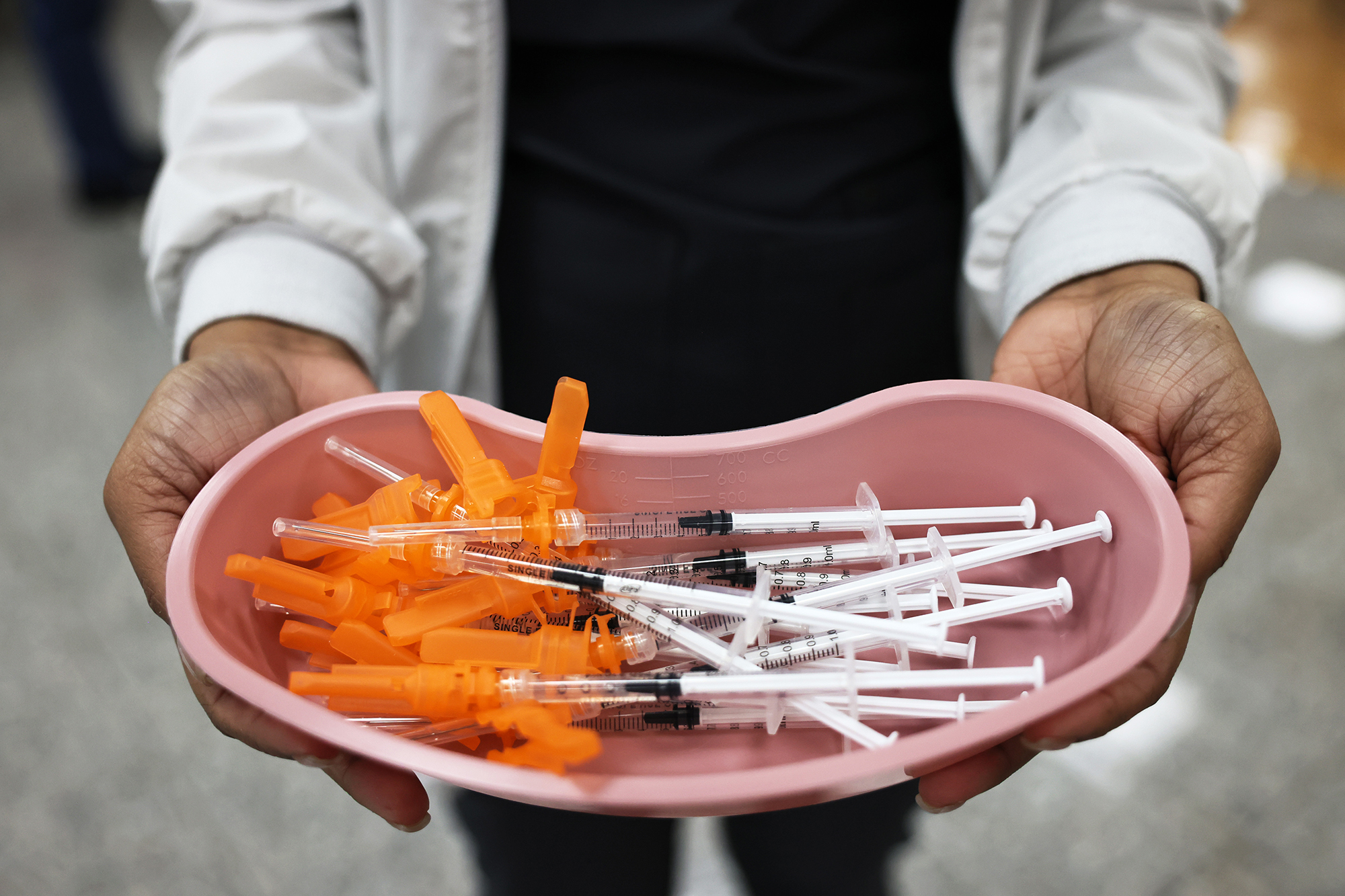
A medical worker with Northwell Health holds up doses of the Johnson & Johnson coronavirus (COVID-19) vaccine at the Northwell Health pop-up coronavirus (COVID-19) vaccination site at the Albanian Islamic Cultural Center in Staten Island on April 08, 2021 in New York City. Michael M. Santiago/Getty Images
The number of Johnson & Johnson Covid-19 vaccine shots allocated to states and other jurisdictions by the federal government is expected to drop 84% next week, according to data from the US Centers for Disease Control and Prevention.
This week, nearly 5 million doses of the Johnson & Johnson vaccine were allocated to states and other jurisdictions, but only about 785,000 are slated for next week.
Allocations of the Pfizer/BioNTech and Moderna vaccines for next week, however, will remain steady compared to this week. About 4.7 million first doses of Pfizer and 3.5 million first doses of Moderna have been allocated for next week, along with corresponding second doses.
Allocations of the Pfizer/BioNTech and Moderna vaccines have been largely consistent week to week. However, weekly allocations of the Johnson & Johnson vaccine have varied widely.
According to data from the CDC, the first allocation of the Johnson & Johnson vaccine – for the week of March 1 – included more than 2.8 million doses. There are no allocations of the Johnson & Johnson vaccine logged for the week of March 8, and allocations dropped to less than 500,000 doses for the two following weeks. Then, for the week of March 29, allocations jumped to nearly 2 million, before more than doubling for this week.
Here are the total allocations for the Johnson & Johnson vaccine to states and other jurisdictions each week, according to data from the CDC:
About 4.5 million people have been vaccinated with the Johnson & Johnson vaccine, accounting for about 7% of people who are fully vaccinated in the US, according to the latest data from the CDC.
From CNN's James Frater
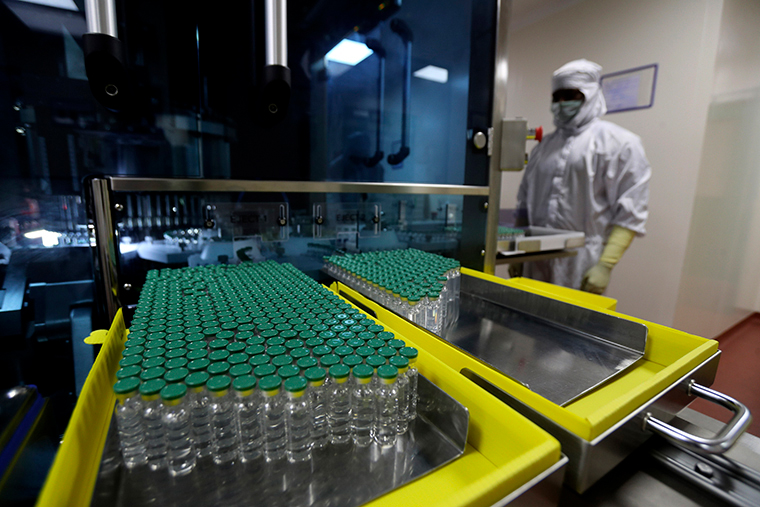
Vials of AstraZeneca's Covishield vaccine for COVID-19 are seen at a filling lab at the Serum Institute of India, Pune, India, Thursday, Jan. 21, 2021. Rafiq Maqbool/AP
The African Union has announced it is dropping plans to buy additional doses of the AstraZeneca Covid-19 vaccine directly from the Serum Institute of India and will instead focus on securing further vaccines from Johnson & Johnson.
John Nkengasong, director of the Africa Centres for Disease Control and Prevention (ACDC), said the decision was not related to recent safety concerns over the AstraZeneca vaccine but “because we work very closely with COVAX,” the vaccine-sharing facility for the world’s poorest countries.
Addressing a virtual news briefing from Addis Ababa in Ethiopia Thursday, Nkengasong explained the pivot to Johnson & Johnson was to ensure, the “Indian Serum Institute was enabled to be able to supply doses to the COVAX mechanism.”
“It was just a clear understanding of how not to duplicate efforts with the Serum Institute, so that we complement each other rather than duplicate efforts,” he added.
Last week, the African Vaccine Acquisition Task Team (AVATT) signed an Advance Purchase Agreement with Johnson & Johnson for 220 million doses on behalf of the 55 member states of the African Union (AU).
Nkengasong said he hoped the vaccines would “begin to be available at the beginning of the third quarter.”
The AU will now explore options of securing an additional 180 million doses of Johnson & Johnson vaccine, he said.
“Given that the Johnson and Johnson vaccine is a single dose, that means we have the ability – if those vaccines are picked up by countries – to immunize 400 million people on the continent,” he said.
The AU's decision comes a day after EU regulator European Medicines Agency (EMA) found that there was a “possible link” between the AstraZeneca vaccine and “very rare cases of blood clots.”
However Nkengasong said, “this (AstraZeneca) vaccine continues to be safe. We will still recommend that the vaccines be used.” He also reiterated the findings of the EMA saying, “the recommendation still stands that the benefits of receiving the vaccine outweighs the risk of the unusual and rare side effects of the vaccine.”
Nkengasong confirmed that “a total 33.8 million vaccine doses have been acquired by Member States, with approximately 12.9 million doses administered” so far.
He welcomed the news that “Seychelles and Mauritius have received enough COVID vaccine doses to reach 20% target vaccination benchmark, which was what the COVAX facility promised.”
“I think every little step and progress that we observe in the continent is good progress” and “it's always good to highlight those success stories,” he added.
Retrieved from: https://edition.cnn.com/world/live-news/coronavirus-pandemic-vaccine-updates-04-08-21/index.html

People wait in front of the vaccination center in Gelsenkirchen, Germany, Wednesday, last week. Germany's health minister says the country is exploring purchasing the Sputnik V COVID-19 vaccine from Russia.
Martin Meissner/AP
BERLIN — The German government is preparing to enter into negotiations with Moscow to pre-order doses of Russia's coronavirus vaccine, Sputnik V, breaking from the EU's joint vaccine procurement efforts.
Following a meeting with his EU counterparts on Wednesday, Federal Health Minister Jens Spahn said that because the EU Commission does not intend to purchase the Russian vaccine for the entire bloc, Germany will go it alone.
Thierry Breton, the EU commissioner in charge of vaccine procurement argues that Sputnik doses would not arrive in time to make any difference to the European Union's vaccination efforts.
But the German health minister sees Sputnik as a stop-gap solution to the current vaccine dose shortage caused by myriad supply issues. Speaking to public broadcaster WDR on Thursday, Spahn cautioned that any potential order of Sputnik V would need to be delivered within two to five months in order to make a difference to Germany's faltering vaccine rollout.
While EU member state Hungary has already started using the Russian vaccine, a German deal with Moscow is contingent upon Sputnik V being approved by the European Medicines Agency, the EU's drug regulator. The EMA started its review of the vaccine in March.
There's already support for the health minister's procurement plans at state level, particularly in formerly Communist region of eastern Germany, such as Saxony-Anhalt and Thüringen. Those states' premiers have long been calling for negotiations with Moscow.
Reiner Haseloff, state premier of Saxony-Anhalt, says that while the EMA must authorize the vaccine, he has faith in its efficacy, adding that he gratefully received the Soviet polio vaccine as a child in the former East Germany, where inoculation against the disease was rolled out earlier than in West Germany.
Meanwhile, initial hesitancy in western Germany about the speed with which the Russians approved Sputnik is waning. The state of Bavaria is even one step ahead of the federal government and has signed a letter of intent to buy up to 2.5 million doses of the Sputnik V vaccine, provided it receives EMA approval. The Bavarians hope to start manufacturing Sputnik at home, in the town of Illertissen.
But the unilateral move by prosperous Bavaria has not gone down well with other, less-wealthy German states, which fear being left behind. Their calls for solidarity in procuring and distributing vaccines echo those made by EU member states at the beginning of the year when they agreed not to enter into exclusive talks with suppliers.
https://www.npr.org/2021/04/08/985410735/germany-says-it-will-explore-buying-russias-sputnik-v-vaccine-bucking-eu-policy
By Jake Spring, Ricardo Brito Reuters
BRASILIA (Reuters) -Brazil on Thursday set a daily record of 4,249 COVID-19 deaths, with overwhelmed hospitals running low on supplies and the Senate about to open an investigation into the response of the government of President Jair Bolsonaro, who has played down the pandemic from the start.
Brazil is nearing the single-day record that the United States registered on Jan. 20 of 4,405 deaths, according to the U.S. Centers for Disease Control and Prevention. Brazil’s outbreak is spiraling out of control, with vaccines in short supply and Bolsonaro fighting lockdowns.
The public healthcare system has shown growing signs of buckling under the caseload, and a survey by the National Association of Private Hospitals (ANAHP) this week suggests even the richest hospitals are running short on critical medicine.
Three out of four private hospitals said they have a week or less of supplies for treating COVID-19, including oxygen, anesthesia and essential drugs for intubation, according to the ANAHP survey of 88 member hospitals across Brazil.
Bolsonaro’s government has minimized the risk of hospitals running out of medicine, as the right-wing leader tries to allay fears of the virus, while railing against state and local efforts to restrict movement.
“Let’s not cry over spilled milk. We’re still going through a pandemic that, in part, is being used politically - not to defeat the virus but to bring down the president,” Bolsonaro said in a public address on Wednesday. “In what country on earth do people not die? Unfortunately, people die everywhere.”
Brazil’s Senate plans to set up a special committee next week to investigate the government’s response to the pandemic, Senate President Rodrigo Pacheco said.
A Supreme Court judge ruled on Thursday that the Senate must proceed with installing the committee, which Pacheco had sought to delay despite already having been approved by a sufficient number of senators.
While stating he would comply with the court order, Pacheco said it was too early to investigate while Brazil was still dealing with the crisis and that the committee would put members’ health at risk as its meetings are held in-person.
More than 345,000 people have died of COVID-19 in Brazil, making it the second-deadliest outbreak after the United States, whose population is about 50% greater at about 330 million.
Brazil’s Supreme Court also ruled on Thursday that state and municipal bans on religious gatherings were legal, in a blow to Bolsonaro, who has called them an attack on religious freedom.
As Brazil suffers the worst of the pandemic, the country has become a testing ground for new vaccines.
Health regulator Anvisa on Thursday approved the fifth late-stage trial for a coronavirus vaccine, greenlighting a study by Canada’s Medicago R&D Inc and GlaxoSmithKline PLC.
Anvisa said the companies were authorized to conduct phase 3 trials in Brazil. The companies are recruiting around 3,500 Brazilian volunteers for the study, which will include some 30,000 people, in the U.S., Canada, Europe and Latin America.
https://www.reuters.com/article/us-health-coronavirus-brazil-idUSKBN2BV38Z